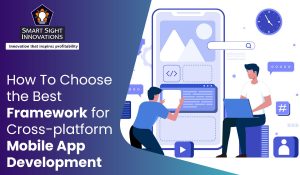 Mobile apps are specific software applications designed to run on mobile devices, such as smartphones or tablet computers. Mobile apps are also referred to as apps, online apps or smartphone apps. These apps are usually small and provide limited and separate software functionality. Gaming apps, lifestyle and entertainment apps, mobile commerce apps, travel apps, utility apps, etc., are some of the most popular types of apps.
Mobile apps are specific software applications designed to run on mobile devices, such as smartphones or tablet computers. Mobile apps are also referred to as apps, online apps or smartphone apps. These apps are usually small and provide limited and separate software functionality. Gaming apps, lifestyle and entertainment apps, mobile commerce apps, travel apps, utility apps, etc., are some of the most popular types of apps.
What Is Cross-platform Mobile App Development?
Cross-platform mobile app development is the process of developing an app that runs on multiple smartphone platforms. This means the same code can be used for the application on all platforms. Every company needs to create mobile apps and develop them for multiple platforms. As cross-platform apps help build software that can be used on various devices, mobile app developers largely prefer using this technology. Some of the advantages of cross-platform development are:
- Speed
- Ability to share codes
- Convenience
- Easy implementation
- Cost-effective
- Compatible across all platforms
Best Cross-platform App Development Frameworks
Currently, a wide variety of frameworks and tools are available for developers. Below is a list of the best frameworks to help you find the most appropriate cross-platform app development framework.
1. Ionic
- Ionic is an open-source front-end framework that allows modifications to the code.
- It is based on AngularJS and combines a few of the best programming languages for mobile app development, like HTML5, JavaScript, CSS, Cordova, etc.
- It is highly responsive, flexible and time-saving.
- It is designed exclusively for mobile operating systems.
- The framework uses Cordova plugins that provide access to built-in device functions like camera, GPS, audio recorder, etc.
2. React Native
- React Native is a framework built on JavaScript to write real code.
- Developers can use native modules to perform complex tasks like image editing, video processing, etc.
- It requires one-time coding for developing apps for diverse platforms, thus reducing the app’s development time and keeping the cost low.
- React Native is extremely compatible with third-party plugins like Google Maps.
3. Flutter
- Flutter is a software development tool intended to speed up designing Android and iOS apps.
- It is a reactive framework and does not require manual updating of the UI contents.
- It encourages a portable GPU that renders UI power and allows it to function on the most recent interfaces.
- It is ideal for creating minimum viable products (MVPs) because it starts the development process quickly and is cost-effective.
- It has an inbuilt graphic engine.
4. Xamarin
- Xamarin is a simplified framework that uses C# and .Net instead of JS libraries and HTML to create programs for Android, Windows and iOS.
- It reduces hardware compatibility issues with the aid of plugins and particular APIs that connect with standard device functions.
- It allows customization.
- It reduces the time and cost of developing an app as it supports WORA (Write Once, Run Anywhere).
- Developers see fewer run-time errors and apps that work successfully.
5. Nativescript
- It is based on JavaScript.
- Nativescript offers all native APIs (application programming interface), allowing developers the option to include pre-existing plugins into the application.
- It renders a beautiful and accessible UI.
- The UI can be customized to specific devices and screens.
- It provides developers with a complete resource of plugins.
- Additional knowledge of the native development language is not required.
- It uses Angular and TypeScript for programming.
6. Node.js
- It is a framework built on the Chrome V8 JavaScript engine.
- It’s highly efficient and responsive.
- The framework can manage several connections running at the same time.
- It includes a massive library of several JavaScript modules.
How To Choose the Best Framework for Cross-platform Mobile App Development?
While choosing a framework for cross-platform mobile app development, you should consider the following:
- People prefer when processes run quickly. The framework should allow you to implement the necessary capabilities and deliver the project within the allotted period. A framework that does not take much of your time is cost-efficient too.
- Choose a developer-friendly and straightforward framework, as working with a complex framework may affect time management and delay app development. This, in turn, could delay the product release. Using a complex framework also tends to increase costs.
- Choose a framework for building accessible mobile apps that can expand along with your user base. As the demand for the app increases, it should develop support for a wide variety of requests per minute (RPMs). The user experience should not be impacted by the growing customer base.
- The framework you select should be a cost-effective development framework. If you have a limited budget, ensure your app has the necessary features.
- Wi-Fi and mobile data are highly vulnerable to security concerns. While developing an app, choose a platform with robust safety and security features.
- Customers prefer an app that gives them a memorable experience. Select a framework to help develop better-quality apps and strengthen the app’s user experience.











